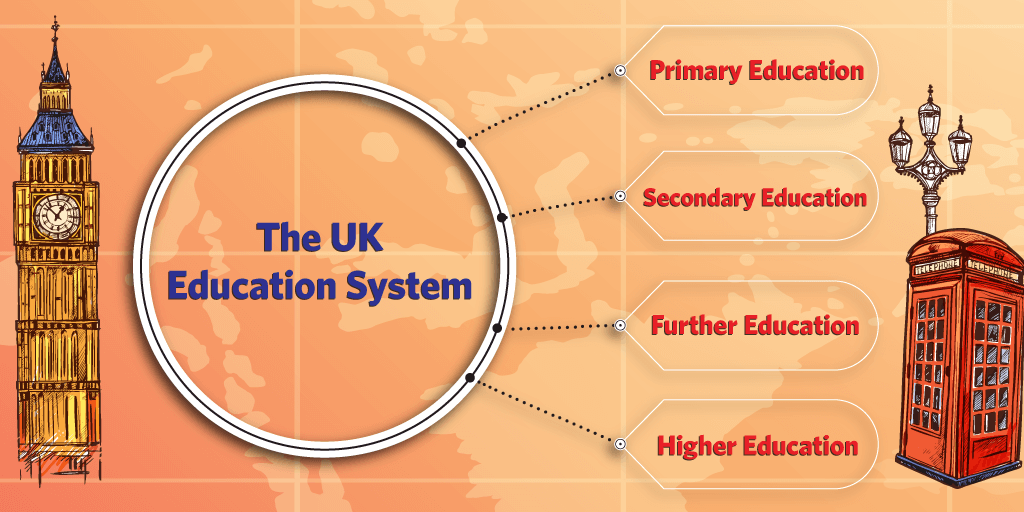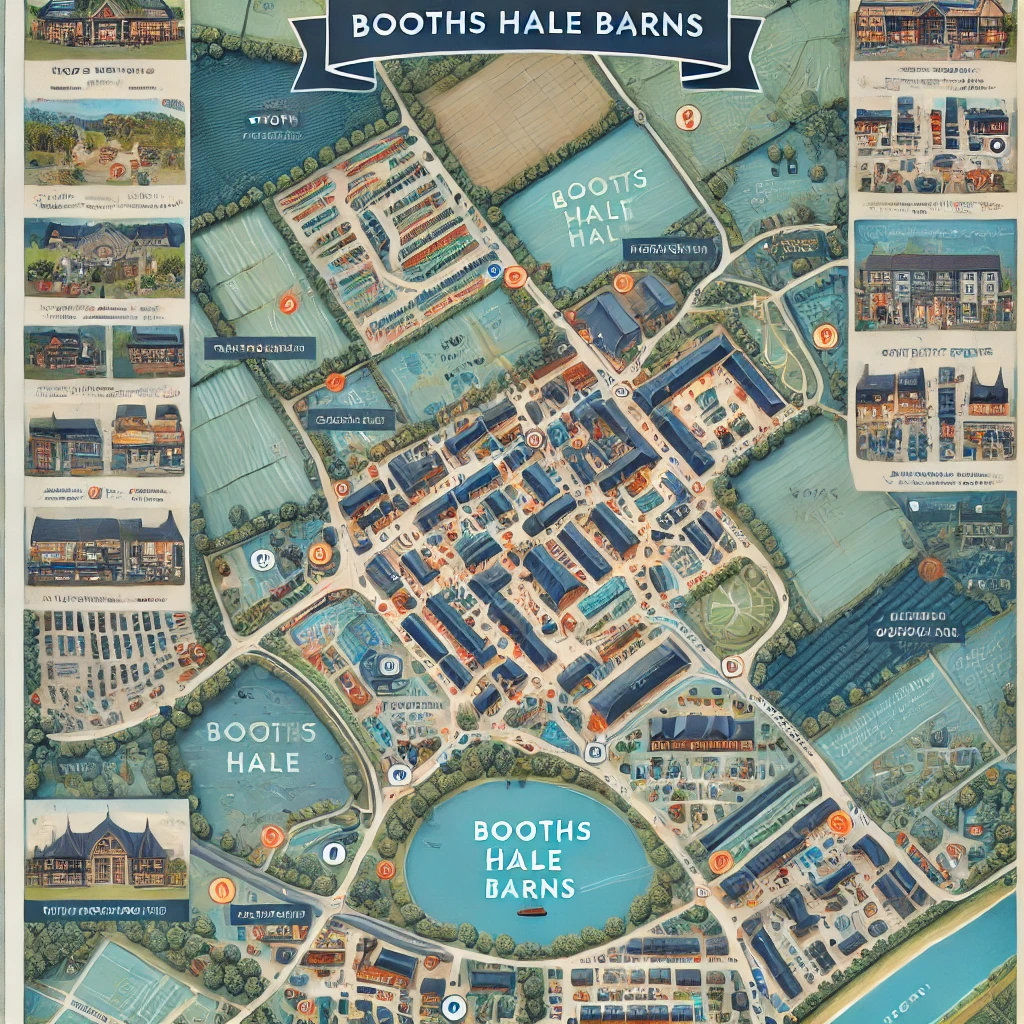The United Kingdom is renowned worldwide for its exceptional education system, offering a blend of traditional excellence and modern adaptability. The country’s institutions consistently rank among the best globally, attracting students from diverse backgrounds who seek quality education and a transformative learning experience. The UK education system is designed to provide a comprehensive foundation of knowledge while fostering critical thinking, creativity, and hands-on skills to prepare students for a rapidly evolving world.
The UK education system is structured into four main stages, each tailored to meet the specific developmental and academic needs of students. These stages are:
- Primary Education – This foundational stage focuses on core subjects and basic skills, nurturing children between the ages of 5 and 11.
- Secondary Education – A more specialized and structured stage that covers students aged 11 to 16, leading to the General Certificate of Secondary Education (GCSE).
- Further Education – Designed for students who wish to continue their studies after the GCSE, this stage offers advanced qualifications such as A-levels or vocational programs to prepare for higher education or career paths.
- Higher Education – Representing the pinnacle of academic achievement, this stage includes undergraduate and postgraduate studies at universities, where students delve deeply into their chosen fields.
Each stage plays a crucial role in shaping a student’s academic journey, fostering intellectual growth, and opening doors to global opportunities. The system’s flexibility, coupled with its emphasis on quality, ensures that students not only excel academically but also develop essential life skills. The UK’s commitment to education has made it a preferred destination for students seeking a world-class learning experience.
Structure of the UK Education System
The UK education system is carefully designed to support students from early childhood through to adulthood, with a strong focus on academic rigor, personal development, and career preparation. The system is both structured and flexible, providing students with the opportunity to specialize and pursue their interests at various stages of their education.
One of the key aspects of the UK education system is its legal framework. In England, children are required by law to attend school from the age of 5 until the age of 18, though they can leave school after turning 16 if they are enrolled in further education or training. This ensures that all young people receive an education that prepares them for both life and work. The education system is divided into four key stages, each with its own set of objectives and learning outcomes.
- Stage One: Ages 5–7 (Key Stage 1)
The first stage of formal education is focused on the foundational skills children need to succeed in later stages of learning. It typically begins with children entering Infant School, where they are introduced to basic literacy and numeracy skills. Subjects like English, Mathematics, and Science form the core curriculum, but there is also a focus on developing physical, emotional, and social skills through subjects like Physical Education and Art. By the end of Stage One, children are expected to have achieved basic literacy and numeracy skills, laying the groundwork for future academic success. - Stage Two: Ages 7–11 (Key Stage 2)
Stage Two builds on the foundations established in Key Stage 1, extending students’ knowledge in core subjects while introducing new ones. Pupils in this stage typically attend Junior School, and subjects such as English, Mathematics, Science, History, Geography, Art, and Religious Education become more prominent in the curriculum. The focus here is on deepening understanding, developing problem-solving skills, and fostering independent learning. At the end of Stage Two, students take their first Standard Assessment Tests (SATs), which assess their proficiency in English and Mathematics. - Stage Three: Ages 11–14 (Key Stage 3)
Stage Three marks the transition into secondary education, and students are introduced to a more specialized and diverse curriculum. Typically, pupils enter Senior School around the age of 11. The core subjects remain English, Mathematics, and Science, but students also begin to study additional subjects such as Foreign Languages, Design Technology, and more advanced Humanities like History and Geography. The emphasis at this stage is on developing critical thinking and analytical skills while preparing for the General Certificate of Secondary Education (GCSE), which will come in later years. - Stage Four: Ages 14–16 (Key Stage 4)
In the final stage of compulsory education, students continue with core subjects but also choose elective subjects that align with their academic interests or career aspirations. By the end of Key Stage 4, students take their GCSE exams, which are the primary assessment tool for measuring their progress. These exams cover a wide range of subjects and are essential for determining what further education or career opportunities students can pursue. The curriculum during this stage is intended to challenge students and prepare them for the next steps, whether that involves further education, vocational training, or entering the workforce.
Together, these four stages of education ensure that students receive a well-rounded education that not only prepares them for future academic pursuits but also equips them with the skills needed to succeed in the world beyond school. Each stage serves as a building block, providing the necessary tools for personal growth and career readiness.
Primary Education
Primary education in the UK is the first stage of formal schooling, and it is crucial in establishing the academic and social foundation that students will build upon throughout their educational journey. This stage typically covers children between the ages of 5 and 11, and it plays a significant role in shaping a child’s attitude toward learning, their overall development, and their future academic success.
Overview of Primary Education (Ages 5–11)
Primary education in the UK is designed to provide children with a strong foundation in key subjects such as English, Mathematics, and Science, while also encouraging creativity and personal development. The goal is not only to equip students with basic academic skills but also to foster social and emotional growth. The curriculum at this stage is structured to be engaging, ensuring that learning is fun and accessible for young children.
Primary education is typically provided by state schools (funded by the government) or independent schools (privately funded). In both settings, the curriculum is carefully designed to stimulate curiosity, critical thinking, and problem-solving skills. In addition to the core subjects, children also have opportunities to explore subjects like Art, Music, Physical Education, and Religious Education.
Division into Infant and Junior Levels
Primary education is often divided into two main phases: Infant School and Junior School, though the structure may vary slightly depending on the school.
- Infant School (Ages 5–7): The first phase of primary education is focused on building basic literacy and numeracy skills, social interaction, and emotional development. Children are introduced to the fundamentals of reading, writing, and mathematics, and the curriculum is designed to be hands-on, with plenty of interactive learning activities.
- Junior School (Ages 7–11): The second phase of primary education builds on the skills developed during the Infant School phase. Here, students begin to deepen their understanding of subjects like English, Mathematics, and Science. The curriculum becomes more structured, and children are encouraged to take on more responsibility for their own learning. This phase also introduces new subjects, such as History, Geography, and Design Technology.
SAT Testing in Primary Education
In the UK, primary education is assessed through a series of tests known as the Standard Assessment Tests (SATs). These tests are designed to assess children’s progress and understanding of key subjects.
- Year 2 SATs (Ages 6–7): At the end of Key Stage 1, children in Year 2 take their first SATs. These tests assess their proficiency in English (reading and writing) and Mathematics. The results of these tests help determine whether children are meeting the expected standards for their age. The SATs in Year 2 are more about monitoring progress than determining academic futures.
- Year 6 SATs (Ages 10–11): At the end of Key Stage 2, students in Year 6 take another round of SATs. These tests are more comprehensive and assess English (reading, writing, and grammar) and Mathematics. The Year 6 SATs are particularly important because the results are used to gauge how well students have mastered the basic academic skills necessary to transition into secondary education.
The SAT results provide valuable feedback for teachers, students, and parents, helping to identify areas where children may need additional support or challenge. However, it’s important to note that while SATs are used to assess academic progress, they are just one part of a larger picture that includes ongoing classroom learning, teacher assessments, and student participation in other educational activities.
Primary education in the UK is a crucial time for young learners, providing the skills and knowledge they need to succeed in secondary education and beyond. The division into infant and junior levels ensures that children receive the appropriate support at each stage of their development, while SAT testing provides a means to monitor and assess academic progress. Ultimately, primary education sets the stage for lifelong learning and personal growth.
Secondary Education
Secondary education in the UK plays a pivotal role in preparing students for higher education, careers, and adult life. Spanning seven years, secondary education is structured to provide both a broad-based education in essential subjects and the opportunity for specialization in later years. Students typically enter secondary education around the age of 11 and continue until they are 16. This phase is divided into junior secondary (Years 7-9) and GCSE years (Years 10-11), with the culmination of studies marked by the General Certificate of Secondary Education (GCSE) exams.
Junior Secondary (Years 7–9)
In the first three years of secondary education (Years 7–9), students experience a broad curriculum designed to build on the skills and knowledge acquired during primary education. This phase is often referred to as Key Stage 3 and serves as the foundation for the more specialized learning that will take place later.
- Core Subjects: The core curriculum for junior secondary includes English, Mathematics, and Science. These subjects remain essential throughout secondary education and are central to students’ academic development. In addition, Humanities (including History and Geography) and Modern Languages (such as French or Spanish) are taught to help students develop a well-rounded understanding of the world and communicate effectively in more than one language.
- Optional Subjects: Alongside the core subjects, students can also select optional subjects based on their interests and the offerings available at their school. These optional subjects may include Music, Drama, Latin, Art, Design Technology, and others. These subjects allow students to explore their creative side, develop new skills, and discover areas of interest that could influence their academic or career choices in later years.
Junior secondary education is a time for exploration and experimentation, and while the emphasis is still on building a strong academic foundation, there is significant room for students to begin developing their passions and interests.
Foundation of GCSE (Year 9)
Year 9 marks an important transition point in secondary education. Students are introduced to the General Certificate of Secondary Education (GCSE) program, which will dominate the next two years of their academic lives. The foundation of the GCSE curriculum begins to take shape during this year, as students start to narrow their focus and decide which subjects they will pursue in more depth.
- Transition from Junior to Senior School: Year 9 is the year when students move from junior secondary to the senior phase of secondary education. This transition often involves a change in the school environment, with students moving to new classrooms and sometimes even to different buildings. They are expected to take on more responsibility for their learning, and the level of academic rigor increases.
- Importance of GCSE Preparation: In Year 9, students choose the subjects they will study for their GCSE exams in the following years. While English, Mathematics, and Science are compulsory, students select a mix of subjects based on their interests, strengths, and future aspirations. The choices made in Year 9 are significant, as they determine the subjects students will focus on for the remainder of their secondary education. Preparing for the GCSE program begins here, with students expected to build the knowledge and skills required for more advanced study in Years 10 and 11.
GCSE Years (Years 10–11)
Years 10 and 11 represent the final two years of compulsory education in the UK, and they are dominated by preparation for the GCSE exams, which typically take place at the end of Year 11. The GCSE exams are a critical component of the UK education system, as they serve as both an assessment of students’ academic abilities and a stepping stone for their future educational and career paths.
- Subjects and Grading: The GCSE curriculum includes core subjects like English, Mathematics, and Science, along with the chosen optional subjects from Year 9. The grading system for GCSEs uses a numerical scale (1-9), with 9 being the highest grade. These grades are essential for determining students’ academic performance and influence their options for post-16 education, including further study or vocational training.
- Options for International Students: For international students who are not yet ready to sit for the full two-year GCSE program, there are options for intensive one-year GCSE courses. These courses are designed to fast-track students through the necessary subjects in preparation for their exams, allowing them to catch up on any gaps in their knowledge and skills. Many schools in the UK offer these intensive courses to international students, providing them with a unique opportunity to pursue a British education even if they arrive later in their academic career.
The GCSE years (Years 10–11) are an intensive period of study, with students expected to master a broad range of subjects. The results of their GCSE exams are crucial for determining the academic and vocational opportunities available to them after secondary education.
Secondary education in the UK provides students with a rigorous and well-rounded academic experience, preparing them for future education, work, and life. The journey from junior secondary to the GCSE years is marked by increasing responsibility, specialization, and preparation for the challenges ahead.
Further Education: University Preparation
As students approach the end of their secondary education, they must decide on their next steps to continue their academic journey. In the UK, further education typically refers to the period after completing GCSEs, during which students prepare for higher education or vocational training. This phase is often defined by two main academic routes: the A-levels and the International Baccalaureate (IB). Both options offer pathways to university and beyond, but they differ in structure and focus.
A-Level Studies
The A-level (Advanced Level) qualification is one of the most popular choices for students in the UK who wish to pursue further education. It is a specialized program that allows students to focus deeply on a small number of subjects. A-levels are typically studied over two years, beginning in Year 12 (the first year of further education) and continuing through Year 13 (the second year).
- Specialization: Students usually select 3 to 4 subjects to study in depth, based on their interests, future career aspirations, and university requirements. These subjects often align with the academic fields students want to pursue at university (e.g., mathematics, sciences, humanities, social sciences, or languages).
- Structure: The first year of A-levels focuses on introducing the material in each chosen subject, while the second year deepens the knowledge and prepares students for exams. The focus on fewer subjects allows for greater depth of learning, with students expected to engage in independent study and research beyond classroom lessons.
- University Entry: A-level results are critical for university admissions. Universities in the UK often specify the required grades for entry into particular degree programs, and students’ A-level results play a key role in whether they are offered a place.
International Baccalaureate (IB)
The International Baccalaureate (IB) is an alternative to A-levels and is offered by many independent and international schools across the UK. The IB program offers a broader, more holistic education, focusing not only on academic subjects but also on personal development, research, and community involvement. Like the A-levels, the IB is a two-year program, typically studied in Year 12 and Year 13, but its structure is more comprehensive.
- Broader Curriculum: Unlike A-levels, which allow students to specialize in a few subjects, the IB requires students to study a total of six subjects, including core areas such as languages, sciences, mathematics, and humanities.
- Higher and Standard Levels: The six subjects are divided into Higher Level (HL) and Standard Level (SL). Students must take three subjects at Higher Level and three at Standard Level. The Higher Level subjects are studied in greater depth and are typically chosen based on the student’s strengths and university aspirations.
- Additional Components: In addition to the six subjects, the IB program includes three additional components:
- Theory of Knowledge (TOK): A course that explores the nature of knowledge and how we understand the world.
- Extended Essay (EE): A 4,000-word independent research paper on a topic of the student’s choice.
- Creativity, Activity, Service (CAS): A program designed to encourage students to engage in extracurricular activities and community service.
- University Entry: The IB is recognized by universities worldwide, and its broad nature is highly valued. While A-levels provide depth in specific subjects, the IB provides a well-rounded education that allows students to apply to a wide range of degree programs. Universities may have specific entry requirements for IB students, often requesting a certain score across the six subjects.
Key Differences Between A-levels and IB
While both the A-levels and the IB provide a pathway to higher education, they differ in their approach to learning and subject selection. Here are some key differences between the two programs:
- Subject Specialization vs. Breadth: A-levels allow students to specialize in 3 to 4 subjects, while the IB requires students to study 6 subjects across a broader range of disciplines.
- Focus and Depth: A-levels are focused on providing in-depth knowledge and expertise in a few subjects, while the IB emphasizes a broader, more general education.
- Core Components: The IB includes additional components like TOK, Extended Essay, and CAS, which aim to foster critical thinking, research skills, and personal development. A-levels do not have these additional requirements.
- University Preparation: A-levels are ideal for students who want to pursue a focused path to a specific university degree, while the IB offers a more flexible education, preparing students for a variety of degree programs and encouraging well-roundedness.
Both A-levels and the International Baccalaureate provide excellent preparation for university, with each program catering to different types of learners. A-levels are best for students who wish to specialize in a few subjects and focus on their chosen field of study, while the IB offers a broader academic experience that develops a wide range of skills. The choice between A-levels and the IB will depend on the student’s learning style, career aspirations, and the type of university experience they wish to pursue.
Higher Education
Higher education in the UK is known for its diversity and academic rigor, providing students with a variety of pathways for both personal and professional growth. The structure of higher education is divided into undergraduate and postgraduate levels, with a wide range of options available depending on the student’s interests and career goals.
Undergraduate Studies
Undergraduate studies in the UK are typically structured around bachelor’s degree programs and last for three years. A bachelor’s degree is the foundational level of higher education, and students usually enter these programs after completing their A-levels or International Baccalaureate. These degree programs offer a deep dive into a chosen subject and allow students to develop specialized knowledge in their field of interest.
- Structure of Bachelor’s Degrees: Most bachelor’s programs take three years to complete, although some programs, such as those in Scotland or certain professional courses like medicine or engineering, may last four or more years. Students select from a wide range of subjects such as arts, sciences, business, social sciences, and engineering. In the first year, students typically explore a broad range of topics within their chosen discipline, while the second and third years allow for more specialized study.
- Vocational Diplomas: For students seeking to enter the workforce more quickly, vocational diplomas offer an accelerated path to higher qualifications. These programs, often taking two years, offer practical training in specific fields, such as business management, engineering, and IT, and are sometimes recognized as exemptions from the second year of a bachelor’s degree program. These diplomas are ideal for students who prefer hands-on learning and wish to enter professional careers with a focused skill set.
Postgraduate Studies
Once students have completed their undergraduate degree, they may choose to continue their education at the postgraduate level, where the focus shifts to advanced study, research, and specialization. Postgraduate studies in the UK are diverse, offering programs in a wide range of disciplines.
- Master’s Programs: Most master’s programs in the UK are typically one year long and offer intensive study in a specific area. These programs allow students to develop advanced knowledge and skills that can be applied in their chosen careers. Master’s degrees are commonly pursued by those seeking further expertise in their field or looking to shift careers. Some popular master’s programs include Master of Arts (MA), Master of Science (MSc), and Master of Business Administration (MBA). The structure of master’s programs often includes taught courses, seminars, and a research project or dissertation.
- Ph.D. Research Degrees: For students interested in pursuing academic or research-oriented careers, Ph.D. programs provide an opportunity to engage in independent research. A Ph.D. can take anywhere from 2 to 7 years to complete, depending on the subject and the individual’s pace of research. During a Ph.D. program, students work closely with academic advisors to explore a research question in-depth, contributing new knowledge to their field. This level of education is particularly suited for those who wish to teach at the university level, work in specialized research positions, or develop expertise in niche areas.
Opportunities for Students
The UK education system offers significant flexibility at both the undergraduate and postgraduate levels. This flexibility allows students to tailor their educational experience to their personal interests and career aspirations.
- Encouraging Personal Development: In addition to academic study, students in the UK are encouraged to participate in extracurricular activities, which play a crucial role in their personal development and employability. These activities can range from sports and volunteering to starting personal projects like blogs or business ventures. Many universities offer support and resources for students who want to explore these opportunities, helping them develop skills such as time management, teamwork, and leadership.
- Blogging and Personal Projects: For students looking to build a strong portfolio and gain real-world experience, starting a blog or another personal project can be an excellent option. The UK’s flexible academic system provides the time and resources to engage in such activities, enabling students to develop skills that complement their formal education. Blogging, in particular, allows students to explore topics of personal interest, connect with others, and build a professional online presence that could be beneficial for their future career.
Read more: The Altrincham Postal Service Crisis
Conclusion
The UK education system is renowned for its quality and variety, offering a range of pathways for students to explore and specialize in their areas of interest. From primary school through to postgraduate study, students in the UK have access to a flexible and well-structured system that emphasizes both academic excellence and personal development.
Whether pursuing an undergraduate degree, enrolling in vocational training, or advancing to postgraduate research, students have opportunities to grow in their chosen fields and beyond. The encouragement to engage in extracurricular activities, such as blogging or internships, further enhances their educational experience, helping them to develop well-rounded skills that are highly valued in the workforce. The UK remains a top destination for international students due to its prestigious universities, diverse programs, and opportunities for personal and academic growth.


















